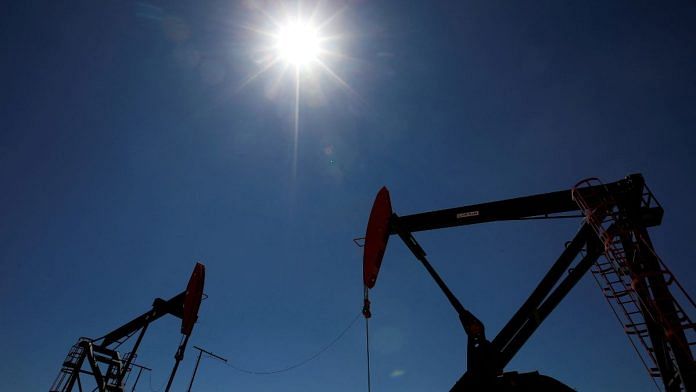New Delhi: Global crude oil prices moved in the northward direction on Monday, following the Israel-Hamas war that entered Day 3 with large fatalities on both sides. Brent crude, often considered the global benchmark, soared as high as about 5 per cent before some correction.
At the time of filing this report, crude oil prices were trading at USD 87.61 per barrel, up 3.52 per cent from last week’s closing. WTI crude was over 3 per cent higher at USD 85.96 per barrel, against their intra-day high of USD 87.23. This comes amid uncertainty in the global inflation outlook as oil prices were already elevated on supply concerns caused by output cuts by some producing countries.
So far, at least 700 Israelis have reportedly been killed, and 300 deaths were recorded on the Palestine side.
On the impact on the oil and energy sector amid the Israel-Hamas war, Union Petroleum Minister Hardeep Singh Puri said: “India will handle it with maturity. As far as the energy sector is concerned, the place where the action is taking place is in many respects the centre of global energy. We will watch very carefully. We will navigate our way through this. These kinds of uncertainties only encourage people to sustainable and cleaner fuel.”
“Oil prices rose more than 4 per cent in early Asian trading on Monday as Hamas attack on Israel threatened to inflame tensions in the Middle East, the source of around a third of the world’s crude…,” Ravindra V.Rao, CMT, CFTe, EPATian VP-Head Commodity Research, said.
“The fallout in markets will likely be determined by whether conflict spreads to the rest of the Middle East region, with oil traders also shifting focus to Iran, which is both a major oil producer and supporter of Hamas,” said Deepak Jasani, Head of Retail Research, HDFC securities.
Meanwhile, OPEC will likely issue its annual World Oil Outlook on Monday, providing updated forecasts for long-term demand and supply.
For India particularly, which is a large importer of crude oil from various sources, this latest price pressure on energy prices will likely be a headache for the policymakers.
On Friday, the Central Bank RBI showed utmost concern is the rising inflation and its attached potential risk to the growth outlook. The overall inflation outlook, RBI cautioned, saying it is clouded by uncertainties from the fall in kharif sowing for key crops like pulses and oilseeds, low water at key reservoirs, and volatile global food and energy prices. RBI Governor Shaktikanta Das said the central bank is concerned and it has identified high inflation as a major risk to macroeconomic stability and sustainable growth.
Meanwhile, since the war between Russia and Ukraine broke out in February 2022, there has been a consistent rise in energy prices. India has been buying large quantities of crude oil from Russia and other possible sources and it has on several occasions maintained that its oil imports will be determined by its national interest and keeping in mind its large consumer base.
As recently as last week, Minister of Petroleum and Natural Gas Hardeep Singh Puri urged OPEC to recognize the gravity of the current economic situation and urged the Secretary-General to use his office to “imbue a sense of pragmatism, balance and affordability in the oil markets.”
On the sidelines of the annual Abu Dhabi International Petroleum Exhibition and Conference (ADIPEC) 2023, on 3rd October 2023, Minister of Petroleum and Natural Gas and Housing, Hardeep Singh Puri had a bilateral discussion with Secretary General, OPEC, Haitham Al-Ghais.
In the interest of global good, the Minister advocated balancing global energy markets by ensuring that crude oil prices do not outstrip the paying ability of the consuming countries.
Cumulatively, OPEC and OPEC+ have reduced the availability of oil by 4.96 mb/d (~5 per cent of global oil demand) from the market since 2022, spiking Brent prices from approx USD 72 per barrel in June to approximately 97 per barrel in September 2023.
During the discussions, the Minister highlighted, that due to the production cuts carried out by OPEC (10) and OPEC+ countries from August 2022 onwards, effectively around 5 per cent of the total global oil availability has been removed from the market, causing crude oil price to rise 34 per cent in just last 3 months. (ANI)
This report is auto-generated from ANI news service. ThePrint holds no responsibility for its content.



